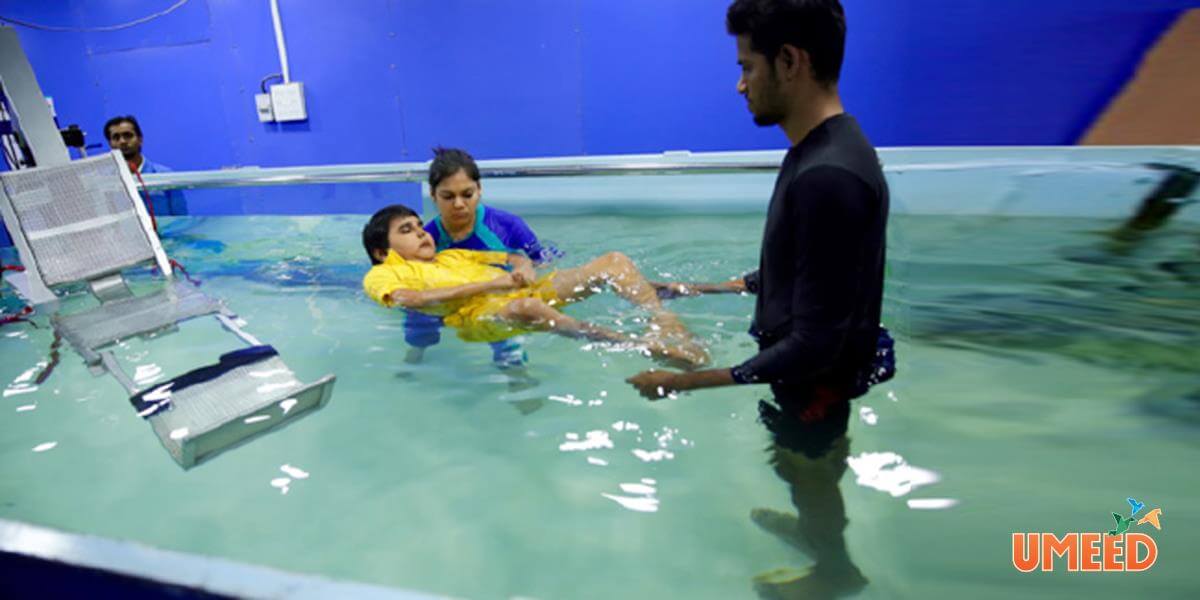
WHAT IS AQUATIC THERAPY?
Hydrotherapy aka Aquatic therapy is an activity that is performed in water (generally a shallow pool)under the supervision of a trained healthcare professional to assist in the rehabilitation & recovery from hard training or a severe injury. It is a form of exercise in warm water & is a popular treatment for patients with neurologic & musculoskeletal conditions. Aquatic therapy is also known as Water Therapy, Aquatic Rehabilitation, Aqua Therapy, Pool Therapy, Therapeutic Aquatic Exercise, or Hydrotherapy.
The objectives of this therapy are Muscle Relaxation, Improving Joint Motion & Reducing Pain. The therapists who are involved in Aquatic Therapy are often in a rehabilitation setting. The therapeutic benefits are often enhanced by the timings as well as the surroundings of the sessions. The Common objectives of AquaticTherapy encompass:
- Improving flexibility.
- improving balance & coordination.
- Building muscle strength & endurance.
- Enhancing aerobic capacity.
- Assisting with gait & locomotion.
- Reducing stress & promoting relaxation.
HISTORY OF AQUATIC THERAPY
Aquatic Therapy has been used for thousands of years around the world. Some examples of them are as follows:
- Ancient Greeks & Romans bathed in hot springs to improve circulation & promote relaxation.
- Hippocrates recommended bathing in spring water as a way to treat sickness.
- Swiss monks were recognized to use thermal waters to treat sick or disabled people in their community.
- Japanese hot springs, or onsens, are said to have medicinal effects that include healing Chronic Pain, Treating Skin Problems, Curing Menstrual Disorders & Relieving Constipation.
- German Physicians were firm believers in Pediatric Water Therapy. Water birthing was very popular throughout Germany in the 1960s &1970s.
BENEFITS OF AQUATIC THERAPY
Mentioned below are several ways that act as an assisting factor due to the natural properties of water that create an Ideal Therapeutic Environment:
- Warm water delivers a relaxing & soothing environment for aching joints & muscles.
- Water’s natural viscosity can be utilized for muscle strengthening & increasing rehabilitation progressions.
- Buoyancy allows flotation & reduce the effects of gravity on injured or sensitive joints & muscles.
- Water pressure supports & stabilizes the body, allowing people with balance deficits to perform exercises without the fear of falling, diminishing the pain & improving cardiovascular return.
- Turbulence & wave propagation let the therapist moderately manipulate the client through these exercises.
- The respiratory muscles are forced to work harder in water, permitting a natural strengthening that benefits the body after the therapy session ends.
Relating to other forms of physical therapy, aquatic therapy shows significantly higher compliance rate & less pain through the recovery process. For athletes who look forward to getting back into competition, or professionals who want to recover from a surgery, make the Aquatic Therapy program a natural choice.
THERAPEUTIC EFFECTS OF AQUATIC THERAPY
- Relieve pain&muscle spasm
- To gain relaxation
- To maintain or increase the range of joint movement
- To re-educate paralyzed muscles
- To strengthen weak muscles&to develop their power&endurance.
- To encourage walking&other functional&recreational activities.
- To improve circulation (trophic condition of the skin)
- To give the patient encouragement&confidence in carrying out his exercises, thereby improving his morale.
- The warmth of water blocks nociception by acting on thermal receptors & mechanoreceptors, thus influencing spinal segmental mechanisms.
- Warm water stimulates blood flow positively, which leads to muscle relaxation.
- the hydrostatic effect may relieve pain by reducing peripheral oedema&by dampening the sympathetic nervous system activity.
PROBLEMS THAT CAN BE BENEFITTED DUE TO AQUATIC THERAPY
Water therapy may be helpful for clients suffering from the following conditions:
- Arthritis
- Arthroscopic surgery recover autism
- Balance disorders
- Cerebral palsy
- Chronic pain
- Depression
- Joint reconstruction surgery recovery
- Joint replacement surgery recovery
- Lower back pain
- Osteoarthritis
- Orthopedic injuries
- Multiple sclerosis
- Rheumatoid arthritis
- Scoliosis
- Stress
- Spinal cord injury
- Sprains&strains
- Stroke
- Traumatic Brain Injury
Conclusion
People of all ages can enjoy & get relieved from the benefits of Aquatic Therapy including children with special needs & senior citizens. An expert professional can create sessions that take into account any age-related physical limitations to promote a positive therapeutic experience, therefore, making it one of the best options for people who do not want to be a part of the long and tiring procedures of other therapies.